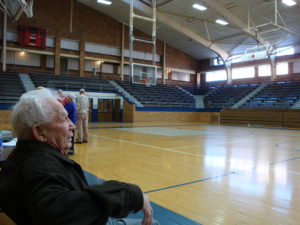Twelve of the 15 coaches featured in the book, “Season of Upsets,” were veterans of World War II. Here is a Veterans Day excerpt from “Season of Upsets”:
We didn’t turn the boat around
I’ll never forget the moment I met former Stillwell coach Hobart Martin. We first talked on the phone and he had a voice you don’t forget. Deep and loud, it hammered through the telephone. I expected to see a giant when we met at his house and there he stood: all five-feet-four-inches of him. But when he talked, the coffee rippled in my mug. His laugh caught me off guard before pulling me into a bear hug. “He certainly wasn’t tall,” Bill Singleton said of his old coach. “We were all much taller than he was—but there was no question about who was in charge. He could holler loudly.” But he rarely had to. That voice commanded attention. When he spoke, his words resonated with purpose.
Hobart grew up in the small town of Young America, Indiana. Nestled in the southwest corner of Cass County, the town had neither a railroad track nor a creek running through it. Its population peaked at three-hundred people. The high school didn’t even bother putting together a baseball team, which required nine boys to play on the field. But basketball only permitted five boys on the floor at a time. Like every other small school in Indiana, the Young America Yanks had a basketball team and from 1939 to 1941, Hobart played guard for the team.
When Hobart graduated from Young America High School in 1941, he considered his career options. He grew up on a farm, but since his older brother already was working with their dad, that wasn’t a viable option. He thought maybe he’d like to be a coach and a teacher, so he moved to Muncie and studied education at Ball State University.
During Hobart’s first semester of college, the United States declared war. The following semester, the military drafted his older brother and he knew it was only a matter of time before he’d be drafted too. Instead of returning to Ball State the next fall, Hobart stayed on the family farm and harvested the fall crop with his dad. Sure enough, the U.S. Army sent a letter to the Martin family farm that winter. One son wasn’t enough, they had decided. Uncle Sam wanted Hobart too. Infantry. Eighty-sixth Blackhawk Division.
While in basic training, Hobart Martin saw an opportunity to leave the infantry in favor of the Army Air Corps. He jumped at the opportunity, was accepted, and sent off to flight training where he passed the certification to become an air pilot and bombardier. Things were looking up for Hobart until a new order suddenly appeared: anybody originally established in a ground unit had to return to it. No more flight training. He was sent back to the 86th Infantry Division and his heart sank. “I felt worse that day than the day I got my draft notice. I knew what that meant.” A big push on the ground was coming.
France. Koln, Germany. The Rhine River. The Ruhr. The Danube. Austria. Munich. Although the Blackhawk Division experienced 1,233 casualties, Hobart survived the European theater on foot. When Germany surrendered, the war wasn’t over. The Blackhawk Division was shipped across the Atlantic, railroaded across the United States, and loaded onto ships off the California coast.
Although Hobart felt he had seen enough war, the Army sent him and the rest of the Blackhawk Division across the Pacific Ocean to invade the island of Japan. Everyone had heard the stories of Bushido, or “honor unto death,” which had been distorted during World War II to lead Japanese soldiers to prefer death over surrender. Hobart wasn’t looking forward to the God-awful terror his unit would meet when their boots hit the sand on the Japanese shore.
The ship carrying these men was in the middle of the Pacific Ocean when a voice announced the news over the loud speaker: Japan had surrendered. The war was over. There would be no need to scramble headlong into a Japanese onslaught. On board the ship, there was a collective sigh of relief and then the boys screamed and hollered with joy. “Everybody was glad,” Hobart said, “but we didn’t turn the boat around!” Instead, the Blackhawk Division sailed onto the Philippines where Hobart eventually finished his tour of duty.
When asked about Truman’s controversial decision to bomb Japan, Martin didn’t waiver. “Let me put it this way: if our unit had to invade Japan—I probably wouldn’t be talking to you today.”
When the Army released him from active duty, Hobart returned to Ball State University. This time around, the U.S. government footed the bill courtesy of the GI Bill of Rights. When he earned his degree, Hobart laughed, “It only took me seven years.”
He still wanted to try coaching and Stillwell High School in LaPorte County needed someone with his credentials, so he checked it out. When Hobart visited the school, the second half of the gym had been finished and he discovered a new school building with a small but good gymnasium. Stillwell had a familiar feel to it—the classes were about the same size as he had experienced back at Young America High School. The town was small, the people were friendly, and the school needed a coach. Hobart accepted the job as business teacher and coach in the fall of 1948.
